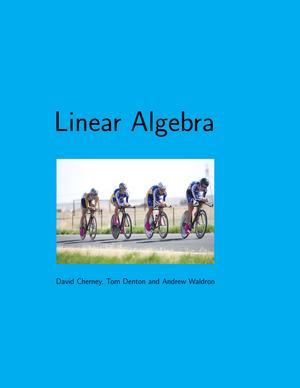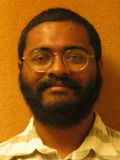
Linear Algebra
This book is suitable for a sophomore level linear algebra course taught in about twenty-five lectures. It is designed both for engineering and science majors, but has enough abstraction to be useful for potential math majors.
Tag(s): Linear Algebra
Publication date: 30 Sep 2013
ISBN-10: n/a
ISBN-13: n/a
Paperback: 430 pages
Views: 9,882
Type: Textbook
Publisher: n/a
License: Creative Commons Attribution-NonCommercial-ShareAlike 3.0 Unported
Post time: 22 May 2016 04:00:00
Linear Algebra
 This book is suitable for a sophomore level linear algebra course taught in about twenty-five lectures. It is designed both for engineering and science majors, but has enough abstraction to be useful for potential math majors.
This book is suitable for a sophomore level linear algebra course taught in about twenty-five lectures. It is designed both for engineering and science majors, but has enough abstraction to be useful for potential math majors.
Publication date: 30 Sep 2013
ISBN-10: n/a
ISBN-13: n/a
Paperback: 430 pages
Views: 9,882
Document Type: Textbook
Publisher: n/a
License: Creative Commons Attribution-NonCommercial-ShareAlike 3.0 Unported
Post time: 22 May 2016 04:00:00
Share — copy and redistribute the material in any medium or format
Adapt — remix, transform, and build upon the material
The licensor cannot revoke these freedoms as long as you follow the license terms.
Click here to read the full license.
Cherney, Denton, and Waldron wrote:This "textbook" (+videos+WeBWorKs) is suitable for a sophomore level linear algebra course taught in about twenty-five lectures. It is designed both for engineering and science majors, but has enough abstraction to be useful for potential math majors. Our goal in writing it was to produce students who can perform computations with linear systems and also understand the concepts behind these computations. For more details, see the Table of Contents or the Preface.
Table of Contents:
What is Linear Algebra? - Systems of Linear Equations - The Simplex Method - Vectors in Space, n-Vectors - Vector Spaces - Linear Transformations - Matrices - Determinants - Subspaces and Spanning Sets - Linear Independence - Basis and Dimension - Eigenvalues and Eigenvectors - Diagonalization - Orthonormal Bases and Complements - Diagonalizing Symmetric Matrices - Kernel, Range, Nullity, Rank - Least squares and Singular Values
Tweet
About The Author(s)
David Matthew Cherney is a Lecturer in the Department of Mathematics at University of California Davis, CA.
.jpg)
David Matthew Cherney is a Lecturer in the Department of Mathematics at University of California Davis, CA.
Tom Denton is an American mathematician. He obtained a PhD in pure mathematics at the University of California, Davis, in 2011, worked as a postdoctoral researcher at York University, in Toronto, Canada, and was a Fulbright Scholar at Maseno University in 2012-13. His research is in algebraic combinatorics, which includes use of the Sage computer algebra system to find and prove new results.

Tom Denton is an American mathematician. He obtained a PhD in pure mathematics at the University of California, Davis, in 2011, worked as a postdoctoral researcher at York University, in Toronto, Canada, and was a Fulbright Scholar at Maseno University in 2012-13. His research is in algebraic combinatorics, which includes use of the Sage computer algebra system to find and prove new results.
Rohit Parathundyil Thomas is a Lecturer in the Department of Mathematics at University of California Davis, CA. His research areas are geometric topology, quantum topology, and categorification.

Rohit Parathundyil Thomas is a Lecturer in the Department of Mathematics at University of California Davis, CA. His research areas are geometric topology, quantum topology, and categorification.
Andrew K. Waldon is a Professor in the Department of Mathematics at University of California Davis, CA. His research is devoted to a broad range of problems in theoretical and mathematical physics. In particular he has made an important contribution to the conjectured Banks-Fishler-Shenker-Susskind (BFSS) matrix model of string theory and M-theory. He has also studied other problems arising in M-theory and in supergravity.
.jpg)
Andrew K. Waldon is a Professor in the Department of Mathematics at University of California Davis, CA. His research is devoted to a broad range of problems in theoretical and mathematical physics. In particular he has made an important contribution to the conjectured Banks-Fishler-Shenker-Susskind (BFSS) matrix model of string theory and M-theory. He has also studied other problems arising in M-theory and in supergravity.